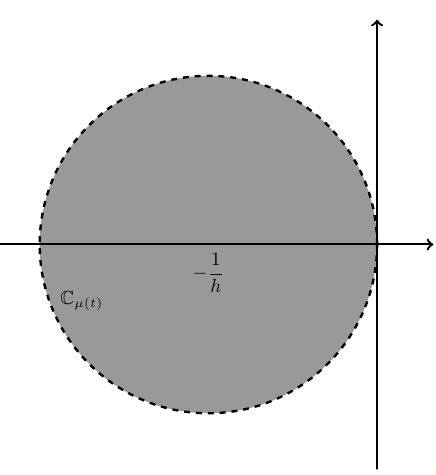Difference between revisions of "Multiples of integers"
From timescalewiki
| Line 15: | Line 15: | ||
|[[Delta_derivative | $\Delta$-derivative:]] | |[[Delta_derivative | $\Delta$-derivative:]] | ||
|$f^{\Delta}(t)=\dfrac{f(t+h)-f(t)}{h}$ | |$f^{\Delta}(t)=\dfrac{f(t+h)-f(t)}{h}$ | ||
| + | |- | ||
| + | |[[Nabla derivative | $\nabla$-derivative:]] | ||
| + | |$f^{\nabla}(t) = \dfrac{f(t)-f(t-h)}{h}$ | ||
|- | |- | ||
|[[Delta_integral | $\Delta$-integral:]] | |[[Delta_integral | $\Delta$-integral:]] | ||
| Line 22: | Line 25: | ||
|$h_k(t,s) = \dfrac{1}{k!} \displaystyle\prod_{\ell=0}^{k-1}(t-\ell h-s)$ | |$h_k(t,s) = \dfrac{1}{k!} \displaystyle\prod_{\ell=0}^{k-1}(t-\ell h-s)$ | ||
|- | |- | ||
| − | |[[ | + | |[[Delta exponential | $\Delta$-Exponential function]]: |
| $\begin{array}{ll} | | $\begin{array}{ll} | ||
e_p(t,s) &= \exp \left( \displaystyle\int_{s}^{t} \dfrac{1}{\mu(\tau)} \log(1 + hp(\tau)) \Delta \tau \right) \\ | e_p(t,s) &= \exp \left( \displaystyle\int_{s}^{t} \dfrac{1}{\mu(\tau)} \log(1 + hp(\tau)) \Delta \tau \right) \\ | ||
| Line 28: | Line 31: | ||
&= \displaystyle\prod_{k=\frac{s}{h}}^{\frac{t}{h}-1} \left( 1+hp(hk) \right) \\ | &= \displaystyle\prod_{k=\frac{s}{h}}^{\frac{t}{h}-1} \left( 1+hp(hk) \right) \\ | ||
\end{array}$ | \end{array}$ | ||
| + | |- | ||
| + | | [[Nabla exponential | $\nabla$-Exponential function]]: | ||
| + | | $\hat{e}_p(t,s)=\left\{ \begin{array}{ll} | ||
| + | \displaystyle\prod_{k=\frac{s}{h}}^{\frac{t}{h}-1} \dfrac{1}{1-hp(hk)} &; t \gt s \\ | ||
| + | 1 &; t=s \\ | ||
| + | \prod_{k=\frac{t}{h}}^{\frac{s}{h}-1} (1-hp(hk)) &; t \lt s | ||
| + | \end{array} \right.$ | ||
|- | |- | ||
|[[Hilger circle]]: | |[[Hilger circle]]: | ||
Revision as of 17:58, 1 March 2015
The set $h\mathbb{Z}=\{\ldots,-2h,-h,0,h,2h,\ldots\}$ of multiples of the integers is a time scale.
| Generic element $t\in \mathbb{T}$: | For some $n \in \mathbb{Z}, t =hn$ |
| Jump operator: | $\sigma(t)=t+h$ |
| Graininess operator: | $\mu(t)=h$ |
| $\Delta$-derivative: | $f^{\Delta}(t)=\dfrac{f(t+h)-f(t)}{h}$ |
| $\nabla$-derivative: | $f^{\nabla}(t) = \dfrac{f(t)-f(t-h)}{h}$ |
| $\Delta$-integral: | $\displaystyle\int_s^t f(\tau) \Delta \tau = \displaystyle\sum_{k=\frac{s}{h}}^{\frac{t}{h}-1} hf(hk)$ |
| $h_k(t,s)$ | $h_k(t,s) = \dfrac{1}{k!} \displaystyle\prod_{\ell=0}^{k-1}(t-\ell h-s)$ |
| $\Delta$-Exponential function: | $\begin{array}{ll} e_p(t,s) &= \exp \left( \displaystyle\int_{s}^{t} \dfrac{1}{\mu(\tau)} \log(1 + hp(\tau)) \Delta \tau \right) \\ &= \exp \left( \displaystyle\sum_{k=\frac{s}{h}}^{\frac{t}{h}-1} \log(1+hp(hk)) \right) \\ &= \displaystyle\prod_{k=\frac{s}{h}}^{\frac{t}{h}-1} \left( 1+hp(hk) \right) \\ \end{array}$ |
| $\nabla$-Exponential function: | $\hat{e}_p(t,s)=\left\{ \begin{array}{ll} \displaystyle\prod_{k=\frac{s}{h}}^{\frac{t}{h}-1} \dfrac{1}{1-hp(hk)} &; t \gt s \\ 1 &; t=s \\ \prod_{k=\frac{t}{h}}^{\frac{s}{h}-1} (1-hp(hk)) &; t \lt s \end{array} \right.$ |
| Hilger circle: | 
|
| Gamma function: | $\Gamma_{h\mathbb{Z}}(t;s)=h\displaystyle\sum_{k=0}^{\infty} \left( \displaystyle\prod_{j=s}^{k-1} \dfrac{j+x}{j+1} \right) \dfrac{1}{(1+h)^{k+1}}$ |